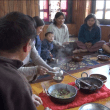In a rare convergence of tradition and modernity, more than 30 monastic and spiritual leaders from across Bhutan gathered in Thimphu over the weekend for a transformative three-day workshop aimed at reimagining leadership and education in the country’s monastic institutions.
The Bhutan Innovation in Pedagogy and Leadership Workshop, organized by the Khedrup Foundation in collaboration with the University of Virginia’s Generative Contemplation Initiative, focused on blending Buddhist wisdom with modern educational and leadership practices. The program, which began on Friday, sought to equip emerging spiritual leaders with the tools to guide their communities through a rapidly changing world.
“The world is changing, and so are our people’s minds and challenges,” said Monla Khedrup, President of the Khedrup Foundation. “It’s crucial that we prepare leaders who can respond to these changes with wisdom, compassion, and adaptability.”
The workshop introduced participants to innovative teaching methods, reflective learning, and leadership development rooted in Bhutanese values. Rather than importing foreign frameworks, the program emphasized co-creating approaches grounded in local traditions.
“We’re not here to impose Western models,” explained Professor David Germano of the University of Virginia. “Instead, we engage participants in a reflective process — to explore innovation and leadership through the lens of Buddhism and Bhutanese culture, while also connecting with global educational trends.”
For many participants, the experience was eye-opening. Teachers and principals from nunneries and monastic schools shared how the workshop reshaped their perspectives on teaching.
“Previously, our classes were continuous, with little variation,” said Namdak Drolma, a teacher at Kuenga Rabten Nunnery in Trongsa. “Now I’ve learned that integrating storytelling, exercises, and interactive activities can keep students more engaged and inspired.”
Similarly, Tashi Dorji, Principal of Tharpaling Shedra in Bumthang, reflected on the importance of student-centered learning.
“We used to focus on explaining concepts,” he said. “But now we understand the value of encouraging students to ask questions, discuss, and truly understand. It’s about active learning, not passive listening.”
As Bhutan continues to balance its rich spiritual heritage with the realities of a modernizing society, initiatives like this workshop highlight a growing recognition of the need for adaptive leadership within the monastic community.
By bridging ancient wisdom with contemporary innovation, the workshop has laid the foundation for a new generation of Buddhist leaders — ones who can nurture both spiritual depth and social awareness in their communities.








